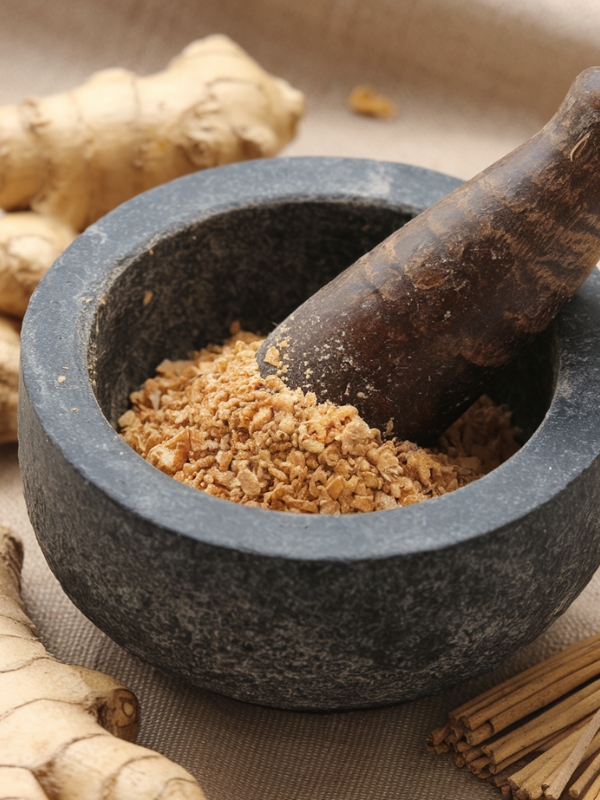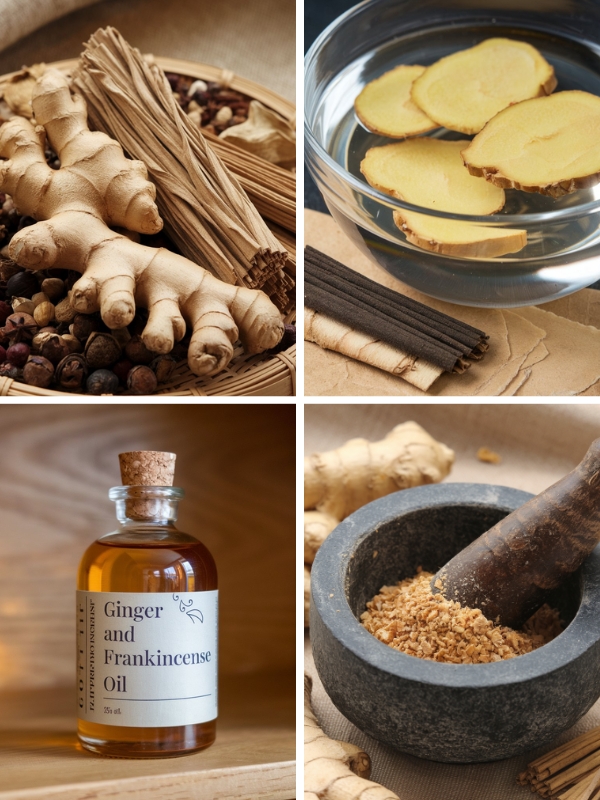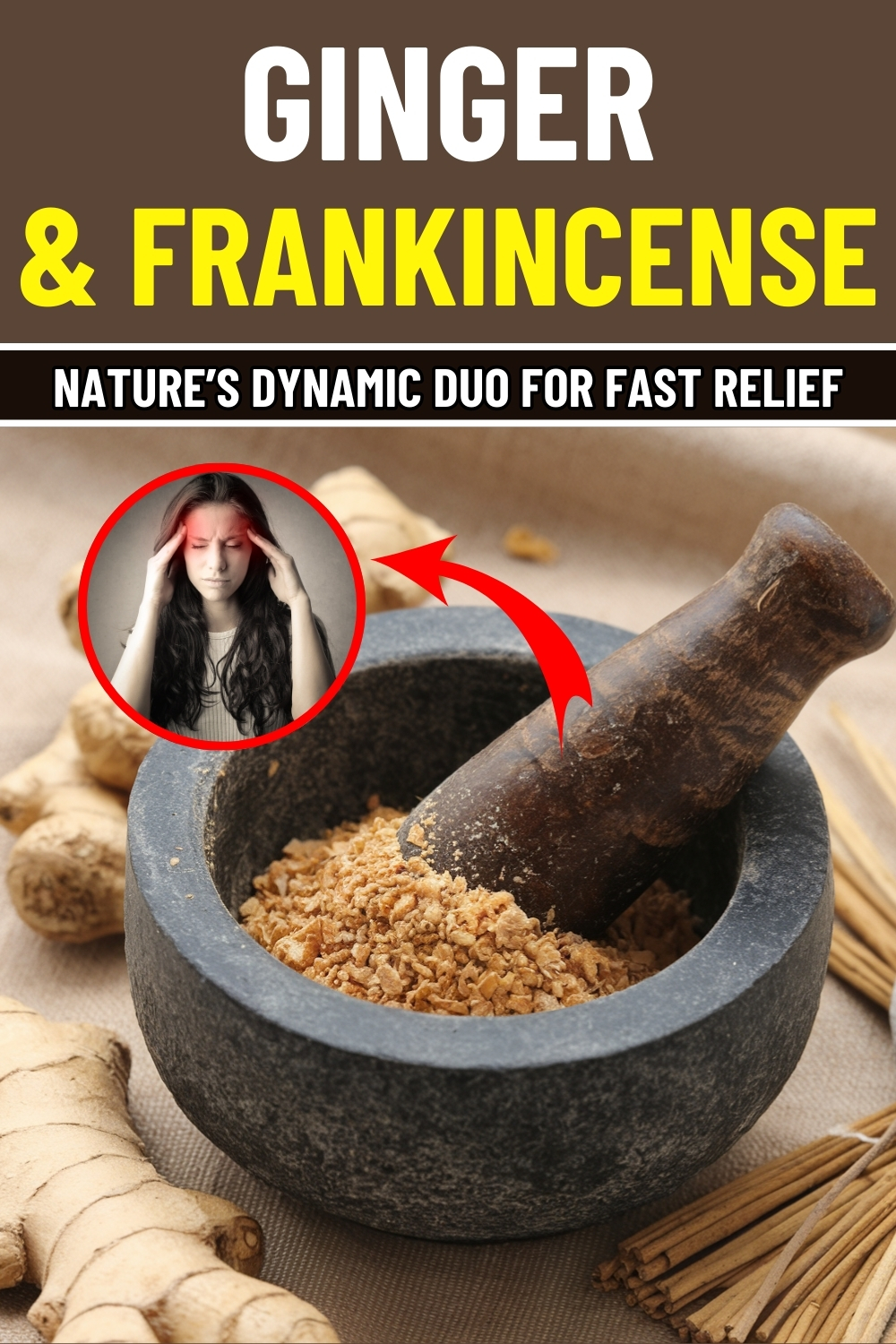Ginger and frankincense are two ancient remedies with science-backed benefits for headache relief. Whether you’re battling tension headaches or migraines, these powerful ingredients may be the relief you’ve been searching for.
Let’s explore why they work and how to use them effectively!
#1. Ginger: The Natural Painkiller
Ginger has been used for centuries as a potent anti-inflammatory and pain reliever. Rich in gingerol, this root works by blocking prostaglandins, compounds responsible for pain and inflammation.
A study published in Phytotherapy Research found that ginger was as effective as sumatriptan (a common migraine medication) in reducing migraine symptoms within two hours.
Plus, its antioxidant properties help combat oxidative stress, a key trigger for headaches.

#2. Frankincense: The Stress and Inflammation Buster
Frankincense, derived from the resin of the Boswellia tree, contains powerful boswellic acids that reduce inflammation and improve blood circulation, two essential factors in headache relief.
A 2012 study in The Journal of Headache and Pain found that Boswellia extract significantly reduced the frequency and intensity of cluster headaches.
Additionally, its calming aroma helps lower cortisol levels, making it perfect for stress-related headaches.
#3. Improves Blood Circulation
Poor blood flow to the brain can trigger headaches. Ginger acts as a natural vasodilator, improving circulation and ensuring oxygen-rich blood reaches your brain.
Frankincense enhances this effect by reducing inflammation in blood vessels, preventing constriction that often leads to tension headaches.

#4. Reduces Nausea Associated with Migraines
Nausea is a common symptom of migraines, and ginger is one of the best natural remedies for an upset stomach.
A 2014 study in The Journal of Ethnopharmacology found that ginger reduced migraine-related nausea and vomiting just as effectively as conventional medications.
By soothing the stomach and relaxing the nervous system, ginger helps tackle migraines from multiple angles.
#5. Eases Stress and Anxiety-Related Headaches
Frankincense is well known for its calming effects on the nervous system. Its natural compounds promote relaxation, making it ideal for headaches caused by stress and anxiety.
Diffusing frankincense essential oil or inhaling its aroma can quickly bring relief by lowering stress hormones and relaxing muscle tension.

#6. Provides Long-Term Migraine Prevention
Consistent use of ginger and frankincense can help reduce headache frequency over time. Their combined anti-inflammatory, circulation-boosting, and stress-reducing properties create a powerful defense against recurring headaches.
A study in Evidence-Based Complementary and Alternative Medicine found that daily use of Boswellia extract reduced the frequency of migraines in chronic sufferers.
How to Use Ginger and Frankincense for Headaches
1. Ginger Tea for Quick Relief
Boil 1 cup of water and add 1 teaspoon of freshly grated ginger. Let it steep for 5–10 minutes. Add a dash of lemon or honey for taste and sip slowly. Drink at the first sign of a headache to maximize relief.
2. Frankincense Aromatherapy for Stress and Tension Headaches
Add 5 drops of frankincense essential oil to a diffuser. Inhale deeply for 10–15 minutes in a quiet, dark room. Alternatively, rub a few drops diluted in a carrier oil on your temples and back of the neck.
3. Ginger and Frankincense Massage Oil
Mix 5 drops of frankincense essential oil and 1 teaspoon of ginger-infused oil with 1 tablespoon of coconut oil. Massage onto your temples, forehead, and neck for instant relief.
4. Ginger and Frankincense Herbal Capsules
Take 250–500 mg of ginger extract and 300–400 mg of Boswellia extract daily. Best taken with food to improve absorption and maximize benefits.
5. Ginger Compress for Migraine Relief
Soak a cloth in warm ginger tea and apply it to your forehead. Leave it on for 15–20 minutes while resting in a dark, quiet space.

Cautions and Precautions
Ginger may cause mild stomach irritation in high doses and should be avoided by those on blood thinners, as it can increase bleeding risk.
Frankincense may cause skin sensitivity when applied undiluted, so always dilute it with a carrier oil before use.
Pregnant or breastfeeding women and individuals with pre-existing medical conditions should consult a healthcare provider before using these remedies.
Disclaimer
This article is for informational purposes only and should not be considered medical advice. Always consult a healthcare professional before using natural remedies for headache treatment.

Say Goodbye to Headaches with This Surprising Ginger and Frankincense Hack
